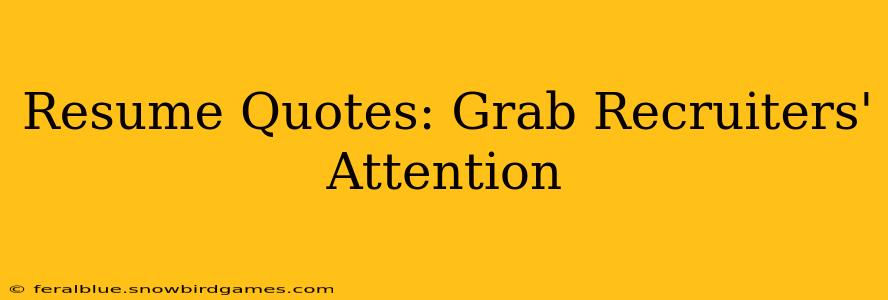Landing that dream job often hinges on making a strong first impression. Your resume is your first contact with potential employers, and a compelling quote can be the unexpected element that sets yours apart. But choosing the right quote is crucial. It needs to be relevant to your field, reflect your personality, and ultimately, grab the recruiter's attention. This guide explores how to strategically use quotes in your resume to elevate your application and significantly increase your chances of landing an interview.
What Makes a Good Resume Quote?
A strong resume quote isn't just any inspiring saying. It needs to be carefully selected and strategically placed. Here's what to consider:
- Relevance: The quote should directly relate to your industry, your skills, and the specific job you're applying for. A quote about perseverance might work well for a sales role, but might be less effective for a software engineering position.
- Brevity: Keep it concise. Recruiters scan resumes quickly. A short, impactful quote is far more effective than a lengthy paragraph. Aim for one to two sentences maximum.
- Impact: The quote should convey your personality, values, and professional aspirations. It should be memorable and leave a lasting impression.
- Originality: Avoid clichés. Choose a quote that's unique and reflects your individual perspective.
- Placement: Consider where the quote will be most impactful. It could be included in your summary/objective statement, or potentially alongside your skills section to highlight your approach to the work. Avoid placing it in the experience section; it's better placed at the top to immediately grab attention.
Where to Place a Resume Quote?
The optimal location depends on your resume style and the overall message you wish to convey. Here are two effective options:
- Summary/Objective Statement: Integrating a quote into your summary can act as a powerful opening statement, immediately conveying your key attributes and professional ethos.
- Skills Section: A short, impactful quote can emphasize your approach to work. For example, if you’re a problem solver, you could choose a quote that underscores this trait.
Example (Summary/Objective Statement):
Instead of: “Highly motivated and results-oriented marketing professional with 5+ years of experience in digital marketing.”
Try: "‘The best way to predict the future is to create it.’ – Peter Drucker. I'm a proactive and data-driven marketing professional dedicated to shaping innovative and effective marketing strategies."
Should I Always Use a Quote on My Resume?
While strategically used, a quote can be a valuable asset, it's not universally necessary. Consider your target audience and the specific job. If the job description emphasizes creativity and innovation, a relevant quote could be beneficial. However, for more traditional industries, a quote might not be as impactful and could even be seen as unprofessional. Ultimately, it's about making a strategic choice that enhances your resume, not detracts from it.
What Kind of Quotes Work Well?
The best quotes are often those that are less obvious and more personally resonant. Instead of generic motivational quotes, consider quotes that reflect your specific skills and values.
For example:
- Leadership Roles: Quotes about teamwork, collaboration, or strategic vision.
- Creative Roles: Quotes that emphasize innovation, imagination, and out-of-the-box thinking.
- Analytical Roles: Quotes focusing on data-driven decisions, problem-solving, or attention to detail.
How to Avoid Common Mistakes
- Overuse: One well-chosen quote is enough. Multiple quotes can appear cluttered and unprofessional.
- Irrelevance: Ensure the quote directly relates to your field and the job you're applying for.
- Poor Formatting: Use proper quotation marks and correctly attribute the quote. The quote should be easy to read and visually appealing.
- Inconsistent Font: Maintain consistency with the rest of your resume's font and formatting.
Using a quote on your resume is a risk, but a calculated one. When done correctly, it can elevate your application and leave a memorable impression on recruiters. However, remember, a strong resume with compelling content is always paramount. The quote should supplement, not replace, the core elements of a successful application.

